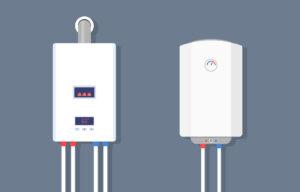Deciphering the Advantages of Tankless Water Heaters: Are They Right for You?
Choosing a new water heater is a crucial decision for homeowners. The dilemma often revolves around whether to opt for a tank or tankless system. While the merits of tankless water heaters are undeniable for specific households, they might not be the ideal fit for everyone. Here’s an overview of the significant characteristics of tankless systems, which can be advantages or disadvantages based on individual needs.
Space-Saving Design
Traditional tank water heaters, or storage water heaters as they’re sometimes known, store between 40 and 80 gallons of water. This voluminous storage inherently occupies considerable space. In contrast, tankless heaters operate on-demand, heating water as and when required, eliminating the need for storage. Their compact design, sans any tank, can be a significant advantage, especially for homes with limited space.
Efficiency in Energy Consumption
Seeking ways to reduce your monthly utility bills without compromising on comfort? Traditional storage water heaters consistently use energy to maintain a set temperature for the water in the tank. On the other hand, tankless water heaters spring into action only when there’s a demand for hot water. As estimated by the Department of Energy, based on your hot water consumption, tankless systems can slash the energy spent on water heating by nearly one-third.
Uninterrupted Hot Water Supply
The nature of hot water supply can be both an asset and a drawback for tankless systems. Conventional storage water heaters can run out of hot water after prolonged usage, like an extended shower. Consequently, there’s a waiting period as the tank refills and reheats the water.
Tankless systems, however, offer continuous hot water based on their flow rates, which can vary between two to five gallons per minute. While the hot water will not “run out” per se, if the demand exceeds the heater’s capacity, the water might not be warm enough. This scenario is more probable in larger households, especially when multiple appliances or showers operate simultaneously.
The Investment Aspect
Undoubtedly, tankless water heaters bear a heftier price tag than their storage counterparts. Installation costs can also surge, especially if transitioning from a tank to a tankless model, as this might require adjustments to existing gas lines or plumbing. For those primarily concerned about the upfront costs, traditional tank heaters might seem more economical.
However, for those who can factor in long-term expenses, the efficiency gains of tankless systems can accumulate over time. Furthermore, while a standard storage water heater might have a decade-long lifespan, tankless models can efficiently function for about 25 years.
In conclusion, while tankless water heaters offer numerous advantages, it’s essential to assess your household’s specific requirements before making an investment.





